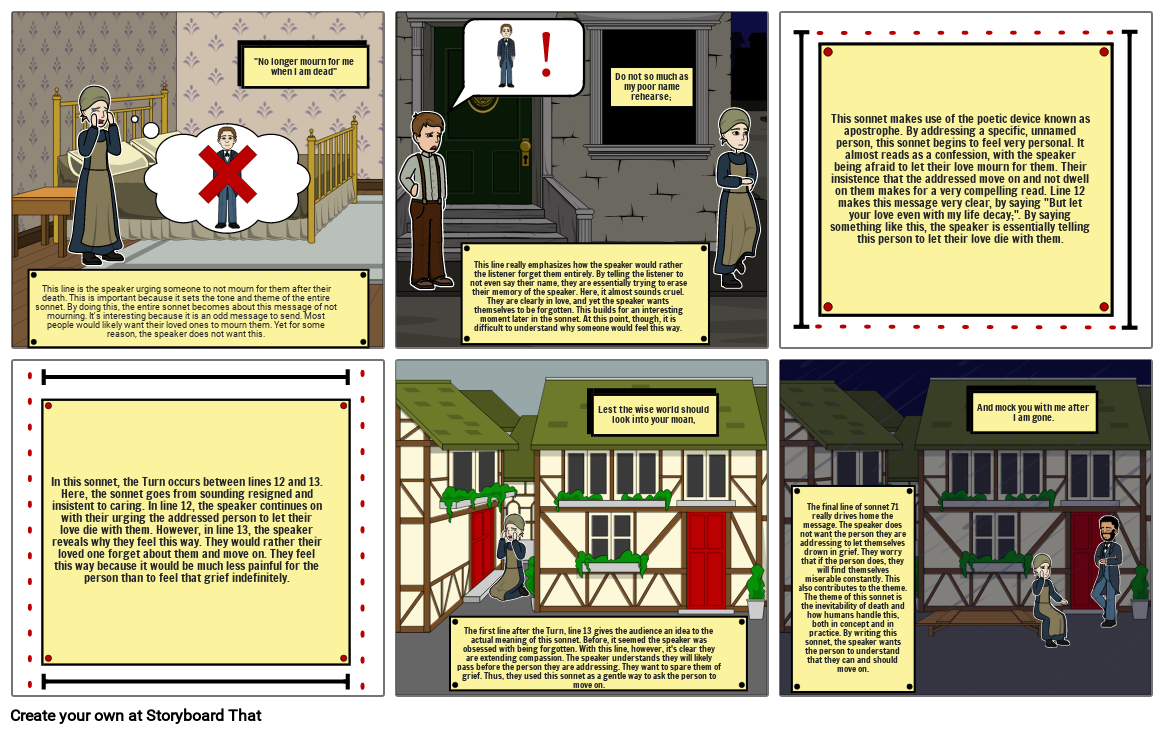Sonnet Portfolio

Текст на Статията
- This line is the speaker urging someone to not mourn for them after their death. This is important because it sets the tone and theme of the entire sonnet. By doing this, the entire sonnet becomes about this message of not mourning. It's interesting because it is an odd message to send. Most people would likely want their loved ones to mourn them. Yet for some reason, the speaker does not want this.
- ahaha
- "No longer mourn for me when I am dead"
- hi
- This line really emphasizes how the speaker would rather the listener forget them entirely. By telling the listener to not even say their name, they are essentially trying to erase their memory of the speaker. Here, it almost sounds cruel. They are clearly in love, and yet the speaker wants themselves to be forgotten. This builds for an interesting moment later in the sonnet. At this point, though, it is difficult to understand why someone would feel this way.
- Do not so much as my poor name rehearse;
- This sonnet makes use of the poetic device known as apostrophe. By addressing a specific, unnamed person, this sonnet begins to feel very personal. It almost reads as a confession, with the speaker being afraid to let their love mourn for them. Their insistence that the addressed move on and not dwell on them makes for a very compelling read. Line 12 makes this message very clear, by saying "But let your love even with my life decay;". By saying something like this, the speaker is essentially telling this person to let their love die with them.
- In this sonnet, the Turn occurs between lines 12 and 13. Here, the sonnet goes from sounding resigned and insistent to caring. In line 12, the speaker continues on with their urging the addressed person to let their love die with them. However, in line 13, the speaker reveals why they feel this way. They would rather their loved one forget about them and move on. They feel this way because it would be much less painful for the person than to feel that grief indefinitely.
- The first line after the Turn, line 13 gives the audience an idea to the actual meaning of this sonnet. Before, it seemed the speaker was obsessed with being forgotten. With this line, however, it's clear they are extending compassion. The speaker understands they will likely pass before the person they are addressing. They want to spare them of grief. Thus, they used this sonnet as a gentle way to ask the person to move on.
- Lest the wise world should look into your moan,
- The final line of sonnet 71 really drives home the message. The speaker does not want the person they are addressing to let themselves drown in grief. They worry that if the person does, they will find themselves miserable constantly. This also contributes to the theme. The theme of this sonnet is the inevitability of death and how humans handle this, both in concept and in practice. By writing this sonnet, the speaker wants the person to understand that they can and should move on.
- And mock you with me after I am gone.
Над 30 милиона създадени разкадровки

